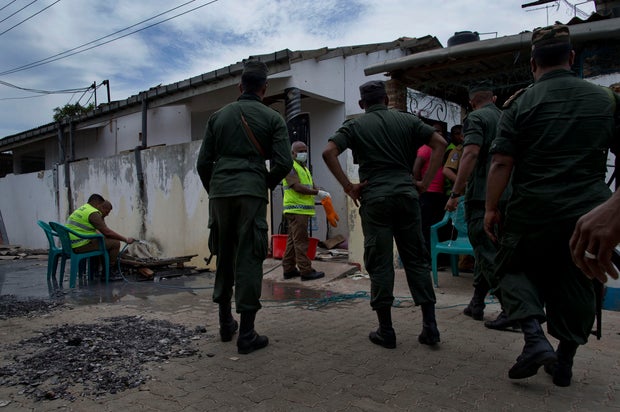BY CBS NEWS:

Kalmunai, Sri Lanka — Suicide bombings by suspects cornered in a militants’ safe house shook an east Sri Lankan town as the investigation into the ISIS-claimed Easter bombings spread. Sri Lanka’s president suspended the chief of police and appointed a new defence secretary on Monday in a shake-up of the shell-shocked country’s security services following the April 21 terror attacks that killed 253 people and injured nearly 500.
Explicit intelligence warnings from abroad about possible attacks by Islamic extremists were ignored ahead of the multiple bombings of churches and upscale hotels, and with an unknown number of suspects still on the loose, tension remained high across the country.
Church services were cancelled and Muslims urged to avoid mosques at the end of last week as police hunted for suspects — whom they concede could still have explosives. The government has banned the wearing of face coverings, including the veil by Muslim women, saying it could hamper the identification of suspects.
Police and military checkpoints dotted the coastal roads of Kalmunai, some 140 miles northeast of the capital, Colombo, with people emptying out of buses to present their identity papers. On streets lined with shuttered shops, police officers with assault rifles looked warily at passers-by. Whispers persist in the town about the leader of the ISIS-pledged militant group said to have carried out the attack. He preached in the town and online the promise of heaven through the killing of others.
Deadly blasts in militant safe house
The blasts when the militant safe house was attacked on Friday night shattered nearly 10 years of peace in Kalmunai — the area was a battle ground in the 26-year civil war with the Tamil Tiger separatists, violence that ended only a decade ago.

One neighbor, Ahamed Mohammed Rizwan, told The Associated Press that leaders at his mosque asked him and two others to go the militants’ house and check on them as he knew the people living there.
As they approached, one man opened the gate and said, “Peace be upon you,” Rizwan said. He replied the same way and they entered the compound and began talking. Suddenly, another man appeared with a Chinese variant of the Kalashnikov assault rifle and aimed it at Rizwan’s chest, saying, “God is the greatest.”
Rizwan and the other men fled and found two traffic police officers, who then started walking toward the house. The militants opened fire, sparking the confrontation, Rizwan said. Those inside later detonated suicide vests, killing themselves and others.
AP journalists walking through the neighborhood Sunday found evidence of the firefight. Spent 7.62 mm cartridges littered the ground, likely from the assault rifle one of the militants carried. Down the street, bullet holes punctured the cement block walls of neighbors’ homes.
Around the house, the scale of the violence became even more clear. A limb still lay in a drainage ditch. The roof of the home had been blown off by the power of the explosion, pages of religious tracts in Arabic lying atop it.
Inside the home, lined notebooks had a child’s shaky Arabic calligraphy. Police also laid out white linen women’s dresses recovered from inside, similar to those worn by Buddhists when they go to temple. Investigators spoke softly to each other, wondering if that meant the militants planned to expand their targets beyond Christian churches.
Soldiers waited until sunrise Saturday before entering the home, ending the violence that killed 15 people. Amid the blood-stained walls and shattered glass, they found a young girl, as well as a woman. Police spokesman Ruwan Gunasekara later identified them as the wife and 4-year-old daughter of Mohammed Zahran, the alleged mastermind behind the Easter Sunday bombings.
The Islamic State of Iraq and Syria (ISIS) claimed Friday night’s suicide bombings, saying early Sunday morning that “with success from Allah the Almighty” the attackers blew themselves up. ISIS has claimed the Easter attacks as the work of its militants, and with its public pledge of loyalty the domestic group run by Zahran does appear to have at least been inspired by ISIS. But the extent to which the now-landless terror group actually helped plan or facilitate the attack on Easter Sunday remains a focus for investigators, who are being aided on the ground by a team from the FBI.
6 children among the victims
Police discovered the bodies of six children inside of the home, all likely the victims of a powerful blast that tore away part of the home’s roof and sent out a deadly wave of small metal balls.
Sifting through debris Sunday afternoon, a police officer discovered the arm of what appeared to be an infant. He cupped it in his gloved hands, blackened from the soot.
“These people are animals,” he said. “How can they have children then blow up these children?”
The officer gently laid the child’s arm down next to a charred assault rifle magazine, a license plate and pieces of a cellphone. It was now evidence of even greater crimes.
